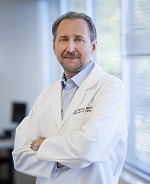ARCHIVED: NOT AVAILABLE FOR CREDIT
Advances in Molecular Genetics of Thyroid Cancer: Impact on Cancer Diagnosis and Patient Management
Dr. Nikiforov will discuss the recent advances in understanding the molecular genetics of all major types of thyroid tumors and how this knowledge is being translated into clinical practice to aid diagnosis of thyroid cancer, predict cancer aggressiveness, and identify therapeutic targets for advanced cancer.
Originally published on March 3, 2022
Lecture Presenter
 | Yuri Nikiforov, MD, PhD Vice Chair, Department of Pathology and Laboratory Medicine |
Dr. Nikiforov is Professor of Pathology and Vice Chair for Molecular Pathology at the Department of Pathology, University of Pittsburgh. He has published over 200 peer-reviewed articles and over 20 book chapters, and is a senior editor of the textbook “Diagnostic Pathology and Molecular Genetics of the Thyroid”, now in its 3rd edition. His research program has been funded by the National Institute of Health continuously for over 20 years and focused on molecular mechanisms of thyroid cancer, radiation carcinogenesis, molecular diagnostics. He is an elected member of the American Society for Clinical Investigation and a recipient of the 2007 Van Meter Award and the 2017 Sidney H. Ingbar Distinguished Lectureship Award from the American Thyroid Association. Other awards include the 2014 Light of Light Foundation Honorary Award, the 2016 Aldo Pinchera Award from the Italian Thyroid Carcinoma Observatory, and the 2019 Dr. Jacques Genest Lecturer Award from The Canadian Society of Endocrinology and Metabolism.
Objectives
After this presentation, participants will be able to:
- Review molecular genetics for all main types of thyroid cancer
- Discuss the use of molecular markers for cancer diagnosis, prognostication, and targeted therapy
Sponsored by:
University of Utah School of Medicine, Department of Pathology, and ARUP Laboratories
 Site Search
Site Search

